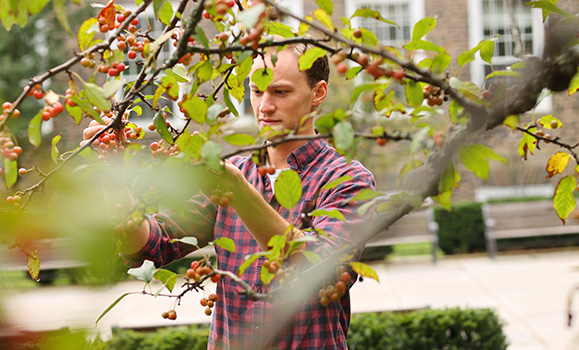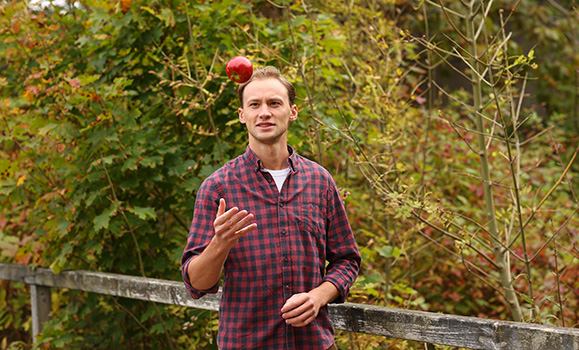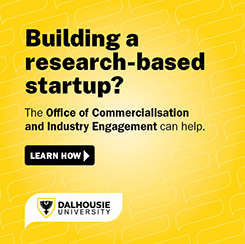The snapshot
Leveraging unique genome mapping research from Dalhousie’s Faculty of Agriculture, startup Foodimprover is set to transform the global fruit sector’s ability to rapidly improve the taste, shelf life and resilience of our favourite fruits and berries.
While gene editing has revolutionized rice, wheat, and corn, Tommy Davies, chief science officer at Foodimprover, says Rosaceous crops, like apples and strawberries, have lagged due to the absence of precise gene editing targets. He says to think of gene-editing methods like CRISPR as a vehicle and the targets as a GPS system.
“Until this point, no one's really had the GPS for Rosaceous crops, they can drive the car, but they have no idea where to drive it to,” says Davies. “Foodimprover aims to bridge that gap by getting good quality, actionable gene editing targets to the industry, particularly for apples, because that's our expertise.”
The challenge
Davies is a PhD student in the lab of Dr. Sean Myles, a leading researcher in Dalhousie’s Faculty of Agriculture who was recently profiled in the for founding Dal’s Apple Biodiversity Collection in Nova Scotia’s Annapolis Valley. The orchard laboratory boasts more than 1,000 varieties of the fruit, making it the most diverse apple orchard in the world.
Dr. Myles also has a penchant for entrepreneurship, having launched a new cheese-based venture and founded and sold a successful cider company. Davies says Dr. Myles brings his entrepreneurial mindset into the lab, continually challenging students to look for real-world applications for their research.
“He pushes us to think beyond the science, to the greater implications of our discoveries and their business and policy implications,” he says. To help channel their creative energies, Dr. Myles set up a whiteboard in his lab and prompted students to pitch their ideas for the most valuable crops to explore.
With ideas buzzing in their heads, the prof and students went for a hike up Nova Scotia’s Cape Split. While treading the path, they stumbled on a conundrum – there’s a lot of gene editing activity, but not a lot of success. Why?
Davies says they quickly arrived at a realization — they simply don’t know where to edit.

The solution
“We thought, wow, it's so crazy that these groups are still pouring all this money into gene editing when they have no targets,” says Davies. “Given our expertise and our resources, we figured we could devise a way to create a genetic map that's valuable for industry.”
And the market for fruit cartography is vast. The players range from massive conglomerates to a fast-growing crop of new agri-tech ventures all aiming to enhance products in the produce aisle, says Davies. Discoveries that make fruit taste better, last longer or resist pests have the potential to be extremely valuable.
“The market is big for these things,” he says. “There's about a billion Rosaceous plants planted every year. And so, if you're collecting a royalty on just a fraction of them, there is a huge prospect for revenue.”
Seeing the opportunity, Dr. Myles and Davies formulated Foodimprover, with Dr. Myles taking the role of CEO and Davies CSO. Then the pair turned to Dal’s Office of Commercialization and Industry Engagement to navigate how to launch a business leveraging research developed at the university.
“OCIE was a great early resource in helping to set our trajectory. They had plenty of wisdom and examples to share that helped us position ourselves early on,” says Davies. “As a university-based startup, it is crucial to ensure that you have freedom to operate, and OCIE was very helpful in getting us to a place where we understood what that meant and how we could get there.”
The pair also took Dal’s 12-week immersive program where Davies says they put in the hard work to validate their business idea.
“They emphasize the importance of doing the thing that no one wants to do – cold calling industry contacts,” he says. But it paid off. “Those conversations are where we formulated our market intelligence and our understanding of where we could potentially capture value.”

The Impact
Davies says Foodimprover is on the cusp of a proof of concept – a new strawberry – that will assure potential clients that they have the mapping expertise to meet their gene editing needs.
“We've had interest from big, medium and small companies,” says Davies, who was working out of biotech accelerator in North Carolina with the support of a potential partner at the time of the interview.
Beyond the promise of breaking into a multibillion-dollar industry, Davies says Foodimprover could make significant contributions to strengthening global food security. He says that dramatic shifts in agricultural environments and new pests resulting from climate change will increase the need for rapid development and adaptation of new crops.
“Apples are the second most valuable crop in Canada, they're one of the most produced fruits on the globe, and they store really well. So, they're huge for human nutrition and year-round health,” he says. “So, when something bad comes up, we need the tools to address it, not on the current scale of 30 years, but perhaps on the scale of four, five or six.”


